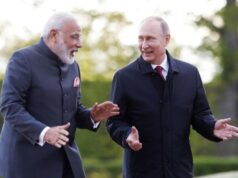NSA Doval-Wang Meeting
National Security Adviser (NSA) Ajit Doval will be off to China for talks, at the level of Special Representative (SR), with his counterpart Wang Yi, on Dec 18th.
This will be their first meeting since the Galwan clash of 2020 froze the relationship. That was until Narendra Modi and Xi Jinping formally broke the ice at the BRICS summit in Kazan, Russia, after intense behind the scenes negotiations.
Doval-Wang Yi Meet
The Chinese Foreign Ministry has confirmed that the NSA Doval-Wang meet will begin with his arrival in Beijing on Tuesday. Talks will be held on Wednesday. The ministry spokesman noted that this will be the 23rd meeting of the SR mechanism which began in 2003.
India’s Ministry of External Affairs also issued a statement, announcing, “the two SRs will discuss the management of peace & tranquility in the border areas and explore a fair, reasonable and mutually acceptable solution to the boundary question”.
Doval and Wang Yi have their task cut out. Sources told StratNewsGlobal that their focus could well be on reviewing the current situation on the Line of Actual Control (LAC) and laying out a road map for the future.
But the Chinese may demand that India restore their access to certain patrolling points in Arunachal Pradesh (Asaphila, Yangtse) which they claim, their forces used to visit before the Galwan clash. There maybe other demands, the sources said.
3Ds: Disengagement, De-escalation, De-Induction
India has outlined a three-step process, disengagement, de-escalation followed by de-induction of troops and equipment from the LAC. Until now, only the first step has been taken.
De-escalation has to logically follow if tensions are to come down on the LAC where the deployment of troops is unprecedented. Add to that constant movement of men and materiel, storage and stocking operations to keep men supplied in sub-zero conditions.
De-escalation is necessary to end this situation and allow the levels of hostility to dissipate, sources said. De-induction is next, basically getting troops from either side to return to their locations prior to the Galwan clash. That could set the stage for normalising ties.
But before that, how do the two sides address the manner in which China tore up so many agreements signed in the 1990s to ensure border peace and tranquility. They need to be re-looked, perhaps revised or changed altogether, the sources said.
Boundary Dispute
The boundary dispute is not the only item on the agenda. A major concern for India is the ballooning trade deficit, now over $100 billion. It has been a long standing demand from Delhi that Beijing do more to address the deficit, but to little avail.
India suspects (as does the world) that China is trade as a strategic weapon. Will things change this time around?
There is the other point that China sees India as in the US camp. This is not true but it is a Chinese argument, probably made with the intention of not addressing Indian concerns.
StratNews Global Sources Say
Doval is expected to reiterate, for the record, that India’s foreign policy is independent of the U.S. and China needs to understand that Delhi is not an American satellite. This is something the Chinese have been told before but it bears reiteration.
Also important to note that over the years, the SR mechanism has become a forum where the two sides discuss strategic issues that includes the nuclear question. China does not officially recognise India as a nuclear power since it has not signed the NPT (Non-Proliferation Treaty).
Rather than undermine its position with an official nuclear dialogue, China has preferred to use the SR mechanism for the purpose. India has gone along with it for now.
The key point here is rebuilding trust, the sources said. Given what happened in Galwan and thereafter, Doval and Wang Yi know that they need to move one incremental step at a time. They need to ensure that each step is calibrated and synchronised if the trust is to hold and grow.
Nitin A. Gokhale is a media entrepreneur, one of South Asia's leading strategic affairs analyst and author of over a dozen books so far on military history, insurgencies and wars.
Starting his career in journalism in 1983, he has since led teams of journalists across media platforms.
A specialist in conflict coverage, Gokhale has covered the insurgencies in India’s North-East, the 1999 Kargil conflict and Sri Lanka’s Eelam War IV between 2006-2009.
Gokhale now travels across the globe to speak at seminars and conferences, and lecture at India’s premier defence colleges. He has founded three niche portals, Bharatshakti.in, stratnewsglobal.com and Interstellar.news.




